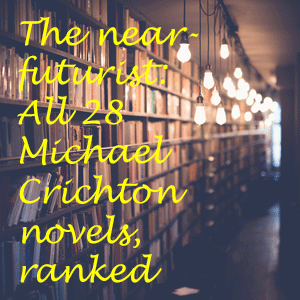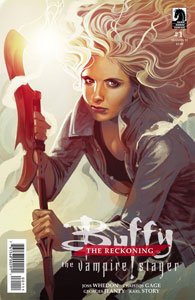“Buffy” Season 12 should ideally be longer than four issues, and I’m guessing it would’ve been 12 issues if the timing had worked out better. But Fox brought the “Buffy” license back in-house – ending Dark Horse’s 21-year run with the title and canceling this 11-year canonical continuation of the TV series – so Joss Whedon and Christos Gage had to cram their final statement into four issues.
That said, if it has to be only four issues, I can’t imagine a better-written capper than “Season 12: The Reckoning” (June-September 2018). The art by Georges Jeanty – with inks split between Karl Story, Andy Owens and Dexter Vines — seems rushed, because I’ve seen it look much better in the past. Still, I can tell who’s who, which is important in a story that includes the entire gangs from “Buffy,” “Angel” (a small group now, comprising Angel and Illyria/Fred) and “Fray.”
It’s appropriate that Jeanty – who was on board from the start of Season 8 — closes out Dark Horse’s “Buffy” saga, but also a shame that Karl Moline isn’t involved somehow, since he originated the look of Melaka Fray and her future world, where a good chunk of Season 12 takes place. In addition to being the final chapter of the “Buffy” story, “The Reckoning” is also the final chapter of the “Angel” story and the “Fray” story. It’s effectively part three of a “Fray” trilogy, following the “Fray” eight-issue series (2001-03) and “Time of Your Life” (“Buffy” Season 8, Issues 16-19, 2008), as Fray’s conflict with her vampire brother, Harth, finally comes to a head.
Sometimes Whedon’s name is on a “Buffy” comic but I question how involved he is – “Giles: Girl Blue” being a recent example – but there’s no doubt Whedon is the lead writer on Season 12. The dialog sparkles in a way only his does (getting more Whedon lines for The Mayor is the only justification for bringing him back to life yet again), especially when Fray and the other Haddyn residents are talking, and when our modern heroes are trying to work through the slight language barrier.
The only downside to the scripting is that Whedon and Gage have to write tight by necessity. So Season 12 jumps ahead a year after Season 11. (Side note: Buffy says she’s 30, which places this story in 2011, not as close to present day as I had assumed, since Season 10 includes pop-culture references to the year 2011. If we write off the Season 10 references as a mistake, this means all of Seasons 8-10 take place in the Aughts, and 2010 is the year they skip over.) During the missing year, Giles uses magic to return to his adult age and look; Spike and Buffy break up, but it’s mutual and they get along smoothly; Xander and Dawn have a baby, Joyce; and Angel and Illyria are a couple, and Fred (who shares Illyria’s body) is cool with it.

I generally loathe the “skip ahead” approach to storytelling. For example, “Crazy Ex-Girlfriend” did it last season in order to fast-forward through a pregnancy, and I still feel like I’m missing something from that time period – not the facts, but the experience of seeing plot points and character arcs play out. The same thing is true with “Buffy’s” missing “Season 11.5” and ideally I’d like that gap filled in some day. (While the comics on this timeline seem to be over, the novels continue with “Slayer,” although the main characters aren’t in it.)
Still, considering the writers’ conundrum, I forgive them. And after absorbing the new reality in Issue 1, things flow very well. Time travel plays a major role in the story, and if there’s ever a time to get away with this conceit, it’s in a finale. Even though the theme of fate hangs over the proceedings – in the “fated” events, Buffy goes to hell to save the Earth by keeping Harth’s demons trapped there – there’s a wonderful symmetry to so much of “The Reckoning.” Yes, Angel says, Buffy or another champion could go to hell again and the world would be fine again, but he thinks they should take a shot at saving both the world and everyone they care about this time. This is the biggest way both Buffy and Angel have grown through the years: They have moved beyond either/or reasoning.
“The Reckoning” draws on the whole history of Slayer lore as we work through the questions of Harth’s powers (he has all Slayer memories and therefore knows “what happens” in this battle he is fighting against our heroes) and how and why Fray is the only Slayer in the future. (There is the occasional too-quick info-dump, like when Giles theorizes that the male mind can’t hold Slayer memories without going insane, but again, Whedon and Gage are making the best of an unfortunate situation.) But despite the theme of fate, the story doesn’t play out in an inevitable way – like, for example, the Season 3 or 7 finales that follow plan-and-execute plotting. Everything makes sense, but I can’t say I predicted exactly how it would go down and the precise role everyone would play.
“The Reckoning” can’t, by its four-issue nature, be the deepest Buffyverse work. All it can be is satisfying, and with Whedon and Gage taking a moment for a final statement or grace note for every major character, Season 12 is definitely that.
Click here for an index of all of John’s “Buffy” and “Angel” reviews.

